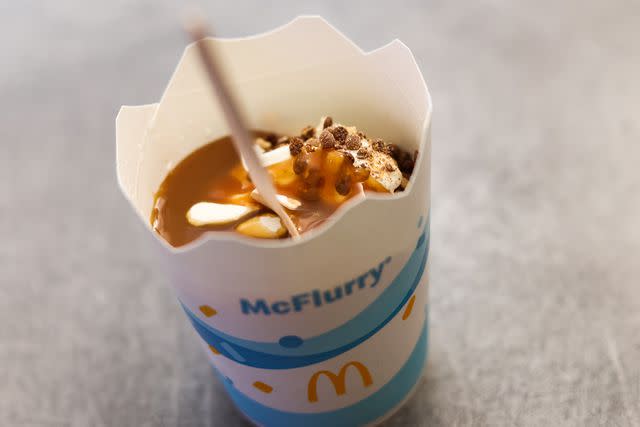Here’s Exactly Why McDonald’s Ice Cream Machines Are Always Broken
It's more complicated than you think.

Food & Wine / Getty Images
Nothing goes with warm weather quite like the taste of ice cream.
However, heading to your local McDonald’s to get a refreshing sundae may leave you — more often than not — disappointed.
McDonald’s soft-serve machines are notorious for breaking down, so much so that in 2020, one frustrated ice cream enthusiast created McBroken, a website where you can check and see if your local machine is up and running.
So what’s the real deal and is there anything to be done? Read on below.
Why are McDonald’s soft-serve machines always broken?
If it seems like you can never get a McFlurry with your Big Mac at your local McDonald’s, the reason is a bit more complicated than you might think.
All of McDonald’s soft-serve machines are made by one company, Taylor. And thanks to Taylor Company’s copyright on the machines, if one breaks, only Taylor is authorized to come fix it. In fact, it’s illegal for a McDonald’s location to try and fix it themselves or call a local handyman to take care of it for them. That means when a machine breaks, it’s essentially up to Taylor when it gets fixed, and there’s not anything your local store can do about it.
Related: The 11 Best Ice Cream Delivery Services to Order Online
On its website, Taylor says that it has people in every corner of the world and that “prompt, personal service is always right around the corner.” However, in many cases, stores are waiting months before a repair person can get them up and running again.

Jakub Porzycki / NurPhoto / Getty Images
All of McDonald’s soft-serve machines are made by one company, Taylor. And thanks to Taylor’s copyright on the machines, if one breaks, only Taylor is authorized to come fix it.Beyond that, when a repair person does show up, that service doesn’t come cheap. Taylor’s repairmen, who are the only ones allowed to touch the machine, can reportedly charge up to $300 every 15 minutes to make that repair. Depending on how busted the machine is, that repair could cost a franchise owner a fairly substantial amount of cash.
Wait, why can't other fix the machines?
The embargo on outside repairs is due to the fact that the machines are copyright-protected. Section 1201 of the Digital Millennium Copyright Act (DMCA) states that repairing your own device can sometimes be ruled a copyright violation.
Exemptions to the DMCA are issued every three years. In the past, exemptions have been granted for unlocking cellphones and ripping a clip from a DVD for educational purposes. In 2021, the exemptions were extended to include the ability to repair any consumer device that relies on software to function.
What is the government doing about it?
Yes, you read that right — the government has decided to get involved. Last year the Federal Trade Commission (FTC) and U.S Department of Justice (DOJ) filed a joint comment to the U.S. Copyright Office asking it to make a change to section 1202 of the DMCA regarding the repair of not just consumer devices, but industrial and commercial equipment as well. If added, that would allow machines like McDonald’s coveted soft-serve machines to be repaired by people without copyright protection for the device.
Related: McDonald's Broken Ice Cream Machine Problem Is So Messy, Apparently the FTC Is Investigating
If other repair facilities are allowed to repair the machines in the future, that would in theory allow those repairs to happen faster and drive down the cost of repairs for franchise owners as well.
The joint FTC and DOJ comment also calls out programmable logic controllers, enterprise IT, and proprietary diagnostic kits as equipment that the agencies hope can receive repair exemptions. In the agencies’ opinion, the move would “promote competition in markets for replacement parts, repair, and maintenance services, as well as facilitate competition in markets for repairable products.”
And, of course, it would make that Oreo McFlurry all the more reliably obtainable.
For more Food & Wine news, make sure to sign up for our newsletter!
Read the original article on Food & Wine.

